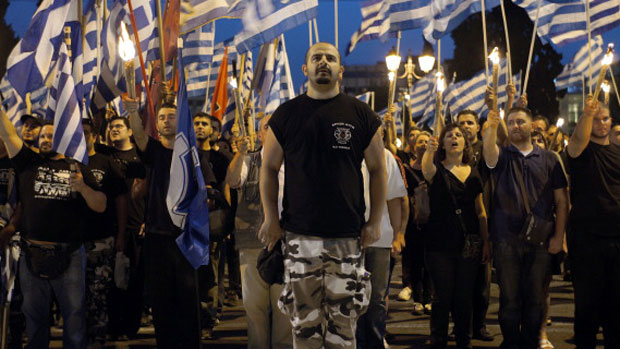Golden Dawn: the rise and fall of Greece's neo-Nazi party
Does arrest of 22 members spell the end for far right party accused of assault, murder and blackmail?

A free daily email with the biggest news stories of the day – and the best features from TheWeek.com
You are now subscribed
Your newsletter sign-up was successful
TWO weeks ago, Greece's neo-fascist party Golden Dawn had every reason to feel confident: it had 18 MPs in parliament and enjoyed as much as 15 per cent of the vote. But the murder of an anti-fascist musician, allegedly by a man with links to the far-right party, has changed all that.
Tens of thousands of people attended street protests and, over the weekend, 22 Golden Dawn members, including leader Nikos Michaloliakos and five MPs, were arrested in dawn raids. They were charged with belonging to a criminal organisation responsible for felonies including murder, assault, blackmail and money laundering.
Here are some of the key developments in the rise and fall of Greece's third biggest political force:
The Week
Escape your echo chamber. Get the facts behind the news, plus analysis from multiple perspectives.

Sign up for The Week's Free Newsletters
From our morning news briefing to a weekly Good News Newsletter, get the best of The Week delivered directly to your inbox.
From our morning news briefing to a weekly Good News Newsletter, get the best of The Week delivered directly to your inbox.
When was the party formed? Golden Dawn's leader, Michaloliakos – who appeared in an Athens court yesterday - began laying the foundations of Chrysi Avyi (aka: Golden Dawn) in 1980. It was registered as a political party in 1993, but was later absorbed into the right-wing Patriotic Alliance. Michaloliakos severed those links in 2007 and Golden Dawn became the primary focus of far-right politics in Greece.
When did it start becoming a serious political force? As recently as the October 2009 general election – a poll held shortly before Greece's credit rating was downgraded - Golden Dawn was winning less than one per cent of the vote and had no representation in parliament, says The BBC. Its fortunes changed the following year as austerity measures began to bite and unemployment soared. In local elections in Athens in November 2010 the party won 5.3 per cent of the vote and a seat at the City Council. In some Athens neighbourhoods with large immigrant communities the party secured as much as 20 per cent of the vote.
Why did the eurozone crisis have such a profound effect? As Greece's woes multiplied many people began looking for someone to blame, says The Guardian. "In an atmosphere thick with resentment and rage, immigrants from Asia and Africa have made easy scapegoats, with growing numbers of Greeks blaming foreigners for the country's record rate of unemployment." Clinical psychologist, Dr Iphigenia Macri told the paper: "Golden Dawn provides a target, which is immigrants. It is targeting all that anger and sense of abuse that, collectively, Greek people feel at the hands of the government and state."
What crimes is the party accused of? Greece's Racist Violence Reporting Network told the BBC that there were 154 racist attacks in 2012. So far this year there have been 104 attacks and two immigrants have been murdered. "Almost every incident is attributed to Golden Dawn," the BBC says.
A free daily email with the biggest news stories of the day – and the best features from TheWeek.com
Who funds the party? No-one is sure. Golden Dawn has flourished in the shadows, says The Guardian. Opponents have "remained eerily quiet" about its structure, its leadership and those who fund it. "Few in Greece's political or intellectual elite have been willing to take on the extremists," says the paper. The lack of public debate about the party has added to the "mystique" of an organisation whose "workings remain opaque," it adds. "The local media appears to have missed the story of Golden Dawn. To this day, the party's financial backers and advisers remain shrouded in secrecy."
How strong has Golden Dawn become? After two international bailouts and a government austerity drive, Golden Dawn won seven per cent of the vote in the two general elections held in 2012. It ended up with 18 seats in Greece's 300-seat parliament. Recent polls carried out before the arrest of its leadership showed support of between 11-12 per cent, says The Guardian. Since the arrests, support has fallen by about 1.5 per cent, but the party remains Greece's third biggest political force.
What triggered the arrests? On 17 September an anti-fascist hip-hop musician called Pavlos Fyssas was stabbed to death outside a café in Athens. Reports say the 34-year-old, who performed under the name Killah P, was attacked by a group of about 15 men. George Roupakias, 45, who told police he was a supporter of Golden Dawn, was arrested and charged over the death. The party strongly denies any link to Roupakias, but its headquarters were raided by police looking for evidence. Greece's Prime Minister Antonis Samaras vowed not to let the neo-fascist party "undermine" democracy, and government officials said Golden Dawn should be treated as a "criminal organisation".
Is this the end of Golden Dawn? While the party's support has dropped since the arrests, it is unclear what effect they will have in the longer term. Al-Jazeera says Golden Dawn's leaders are likely to be "mired in legal difficulties" for some time and without them its rank-and-file members are "hopelessly lost". But much depends on the strength of the authorities' case. If the upcoming trials are "botched", and evidence is seen to be weak or unconvincing, the party may emerge stronger than ever. "But for now the party, whose hateful ideology has done so much damage to this country's reputation, is in deep trouble," Al-Jazeera says.